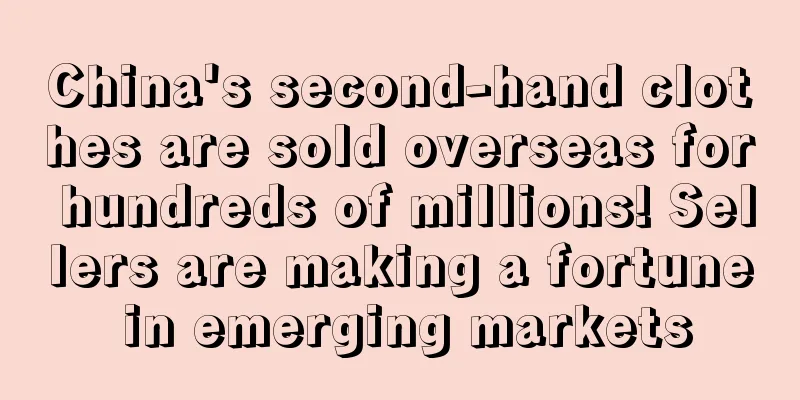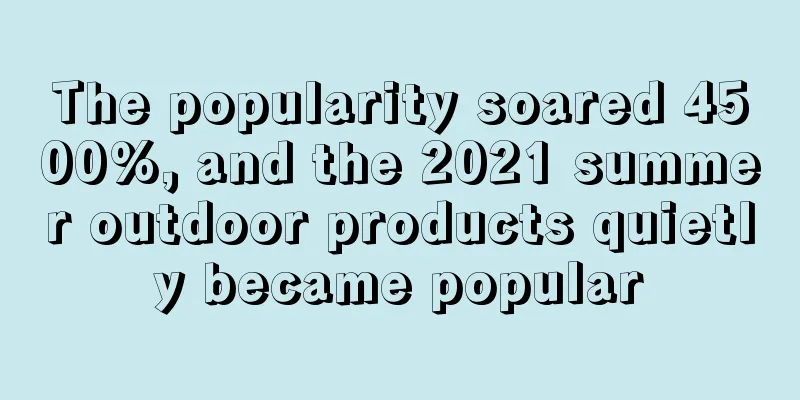China's second-hand clothes are sold overseas for hundreds of millions! Sellers are making a fortune in emerging markets

|
Many sellers give priority to the European and American markets when going overseas, but now with the influx of a large number of sellers, market competition has intensified, and the "involution" in the European and American markets has become more serious .
As a result, more and more sellers are turning their attention to emerging markets to find new growth curves. Not only have they discovered new business opportunities in new markets, but they have also made a lot of money.
Sellers went to Africa and made sales of hundreds of millions!
In recent years, the second-hand economy has become increasingly popular, and many consumers have developed the habit of buying second-hand items and selling unused items .
Many companies have also seen this business opportunity. Guangzhou Greize is one of them. It sells second-hand clothes from China to Africa and earns 200 million yuan a year.
Guangzhou Gretcher Recycling Resources Co., Ltd. was established on August 31, 2016. The company focuses on the development of the entire industrial chain of idle textiles, integrating R&D, design, production, sales, logistics, sorting, export trade and other businesses. At present, the company has opened up the entire industrial chain of used clothing, from recycling to sorting and processing, to export and recycling, solving the problems in the process of recycling used clothing.
Through its big data system and logistics recycling network, Gretchen collects idle textiles together and sorts them into more than 160 categories . Wearable clothing is exported to 80 countries including Africa, Southeast Asia, South America, and the Middle East. Unwearable clothing is made into recycled fibers to create recycled products such as greenhouse insulation blankets and car sound insulation cotton.
(Picture from: Gretchen's official website)
Currently, Africa is the world's largest second-hand clothing consumption market. The second-hand clothing industry is a very important industry in Africa and has created millions of jobs in Africa .
According to the research data of the " 2023 Clothing Recycling Report" , the global second-hand clothing market is growing rapidly, and the market size is expected to grow to US$350 billion by 2027. Among them, the market size in Africa will reach US $250 billion.
In 2021, China became the largest exporter of second-hand clothing in Africa, with Chinese second-hand clothing accounting for more than 40% in Kenya .
Gretcher has long seen this business opportunity and has identified Africa as an important market for the export of second-hand clothing .
Gretcher recycles residents' discarded clothing through old clothing recycling bins, door-to-door express delivery, and third-party recycling .
Gretcher has opened three factories in Guangzhou and Shandong. The workers' daily work is to sort, organize, disinfect and pack second-hand clothes .
Workers at the Gretcher factory will carefully classify second-hand clothes into tops, pants, coats, bags, shoes and other categories, and then further subdivide them. For example, pants are classified into jeans, cotton pants, shorts, trousers, etc., and jeans are classified into men's jeans, women's jeans, children's jeans. According to the different styles of jeans, they are classified into skinny jeans , bell-bottom jeans , ripped jeans, etc. At the same time, they are also classified according to the different materials of the clothes, such as pure cotton, polyester, wool, down, etc. After careful sorting, these clothes will be fumigated and disinfected with ultraviolet rays , compressed by hydraulic presses, packed into containers, and enter the market.
Gretcher 's multiple agents in Africa will place orders with the company , and the unit of measurement for the orders is "tons", and the categories vary according to demand. These second-hand clothes are compressed into cubes and packaged, and distributed to Gretcher's multiple agents in Africa.
After receiving the goods, these agents will take them to their own warehouses. Wholesalers have already been waiting at the warehouse door. After being transferred many times by wholesalers, these second-hand clothes will be sent to second-hand clothing markets or shopping malls in various cities and villages in Africa and put up for sale .
However, before the clothes are sold, the cleaners in the market will wash the clothes clean and iron them neatly. Missing buttons or broken zippers will also be repaired or replaced. After cleaning and repair, these second-hand clothes are no different from new clothes .
Most of these second-hand clothes sold are labeled with the Gretchen brand. After a series of processes, these second-hand clothes are brand new and put back on the market for sale.
In the first year of Gretchen's establishment , the volume of second-hand clothes sold to overseas markets through Alibaba International Station reached 2,000 tons.
With its excellent product quality , Gretchen has expanded into overseas markets, with its business covering more than 120 regions and countries including Africa, Southeast Asia, the Middle East, and the Americas, and possesses stable market resources with great development potential.
While its performance has been growing rapidly, Gretchen has also gained favor from the capital market.
In May 2021, Guangzhou Greizer Recycling Resources Co., Ltd. was listed on the New Fourth Board with the stock code 880572.
In 2023, Gretchen's sales of discarded second-hand clothes in markets such as Africa have exceeded 200 million yuan, of which 60% of second-hand goods are exported to Africa.
The "King of African Mobile Phones" sells over 60 billion worth of products a year !
Another company that is also targeting the African market and striving to become the top business in the industry is Transsion Holdings .
At present, Transsion Holdings ’ mobile phone market share in Africa has reached 40%, making it the veritable “King of Mobile Phones in Africa”.
According to public information, Transsion Holdings was established in 2013 and is headquartered in Shenzhen. The company focuses on the design, research and development, production, sales and brand operation of smart terminals with mobile phones as the core. Its main products are the three major brand mobile phones of TECNO, itel and Infinix . At present, Transsion Holdings' global sales network has covered more than 70 countries and regions, including Nigeria, Kenya, Tanzania, Ethiopia, Egypt, India, Pakistan, Bangladesh, Indonesia, Philippines, Saudi Arabia, Colombia, Brazil, etc.
In 2023, Transsion Holdings achieved operating income of 62.295 billion yuan, an increase of 33.69% compared with 2022; net profit attributable to shareholders of listed companies was 5.537 billion yuan, an increase of 122.93% year-on-year
The African market is an important market for Transsion Holdings.
Many people are not optimistic about the African market, believing that its infrastructure and economy are backward, but Transsion Holdings does not think so.
Zhu Zhaojiang, the founder of Transsion Holdings, once worked for the state-owned Bird Mobile Phone Company and volunteered to develop the African market. Later, as Bird Mobile Phone Company declined, Zhu Zhaojiang decided to start his own business.
Transsion Holdings was established in August 2013. In just seven years, the company sold mobile phones all over Africa and was known in the industry as the "King of Mobile Phones in Africa."
At the beginning of the company's establishment, Transsion Holdings focused on the research and development of mobile phones and launched two major mobile phone brands, TECNO and itel. Later, it set its sights on the African market.
To successfully break into new markets, accurate market positioning is a must. Transsion Holdings has a deep understanding of the local communication environment and user needs in Africa, and has customized the "four-card, four-standby" function, thus solving the problem of local users having to carry multiple phone cards due to unstable operator signals.
On the other hand, due to frequent power outages in Africa and hot weather with large temperature differences between morning and night, Transsion Holdings has developed ultra-long standby functions, low-cost high-voltage fast charging technology, sweat-proof USB ports, and new wear-resistant and sweat-resistant ceramic materials to precisely meet the needs of local consumers.
The camera function of mobile phones is also very critical. Since Africans have darker skin, it is difficult to be recognized in photos. Therefore, Transsion Holdings has developed a camera technology based on eye and tooth positioning, as well as a function that can still take high-quality photos in low-light environments.
In the African market, consumers are generally sensitive to prices, and the mobile phone market is dominated by low-end products. Based on this market characteristic, Transsion has improved the cost-effectiveness of its products and launched mobile phones priced lower than its peers, attracting a wide range of consumer groups.
In addition to the above factors, continuous technological innovation and R&D investment are also important reasons for Transsion Holdings to win in the market. Technological innovation is one of the core strategies of Transsion Holdings. The company has been increasing its R&D investment and building a three-level R&D system of basic research, technology R&D and product development. Through continuous technological innovation, the terminal experience of mobile phone users and the competitiveness of products have been improved, and Transsion Holdings has continuously launched new products that meet market demand , accelerating its business in the African market.
Why do so many companies choose the African market? In addition to the high demand for related products in the African market, there are also the following factors.
First, Africa's economy has experienced rapid growth in recent years. In 2024, Africa will become the second fastest growing region in the world, second only to Asia, with an estimated GDP growth of 3.8% in 2024. Africa's abundant natural resources, young labor force and growing middle class are driving its rapid economic growth.
Secondly, Africa has a large and young population. In 2023, Africa's population will exceed 1.46 billion, and the average age of the African population is 19, much lower than other parts of the world. A young population means a higher acceptance of new things and a higher willingness to pay, so it has the most dynamic market.
The third aspect is that Africa has a high mobile Internet coverage rate, which currently reaches 85%. However, there is a gap in the use of mobile Internet in different regions of Africa. In 2023, South Africa and West Africa will mainly use 4G networks, while Central Africa and East Africa will mainly use 3G networks .
Fourth, the current market competition in Africa is relatively small. For the newly-started African market, capital concentration is relatively low and competition is relatively small, making it very suitable for companies to enter .
Fifth, policy support . Currently, many governments in Africa support foreign investment and provide preferential policies to promote local economic development and market opening .
Cross-border sales win the Middle East market
In addition to those companies that focus on emerging markets, big sellers with rapidly accelerating performance are also exploring emerging markets, such as Anker Innovations and UGREEN Technology, which have outstanding market performance in the Middle East market.
Public data shows that in 2022, Anker Innovations' revenue in the Middle East market exceeded 700 million yuan, up 35.71% year-on-year. In 2023, Anker Innovations' revenue in the Middle East market reached 900 million yuan, accounting for 5.19% .
Anker Innovations also performed well on Amazon Middle East.
Faraz Mehdi, Anker's sales director for the Middle East, Africa, South Asia, the United Kingdom and Ireland, said that Amazon Middle East is an important part of Anker's global business layout. Currently, Anker's main products on Amazon Middle East include cables, headphones, vacuum cleaners, etc. In 2023, the sales share of high-end models of vacuum cleaner products increased by about 30% compared with 2022; in addition, during White Friday in 2023, Anker's brand soundcore true wireless headphones achieved a year-on-year growth of more than 100%.
Anker Innovations has recruited strong local agents in the Middle East , opened Anker flagship stores in Dubai and Kuwait , and continuously launched products that are more suitable for local consumer needs, driving rapid growth in performance.
UGREEN Technology also has an excellent market performance in the Middle East. Up to now, UGREEN's sales on Amazon Middle East have maintained double-digit growth for three consecutive years; UGREEN's Middle East business accounts for more than 6% of UGREEN's overall Amazon business. UGREEN's Nexode series of chargers and power strips have become popular products on the Middle East site, especially during the Double Eleven and White Friday promotions.
In addition to Anker Innovations and UGREEN Technology, many start-up brands are also emerging in the Middle East.
TYMO was founded in 2019 and is a fashion personal care brand. The company is mainly engaged in the research and development of hair styling tools. Its main products include TYMO straightening combs, TYMO splints, TYMO curling irons, hair dryers, hair care, etc. It is a very young technology brand .
The brand's core product is a straight hair comb. In June 2022, TYMO officially entered the Middle East site. According to local religious culture, nylon hair was used to replace the pig brown hair commonly used in combs. The product became the number one in the straight hair comb category in the Middle East site just one month after its launch.
With its strong strength, TYMO has stood out among a number of big brands in just a few years , delivered impressive results, and gradually completed its transformation .
In recent years, many cross-border companies have been rushing to enter the Middle East market.
The Middle East market refers to a region that is mainly in West Asia and spans three continents: Europe, Asia, and Africa. It includes 20 countries , including the United Arab Emirates, Bahrain, Oman, Kuwait, Saudi Arabia , Qatar , and Egypt. The Middle East is rich in oil resources, and its per capita GDP and consumption level are also very high . Currently, the total population of the Middle East has reached more than 490 million, and the average age of the population in the entire region is 25 years old. More than half of the Middle Eastern people are young people, who are also the main force of Internet shopping.
Although the cross-border e-commerce market in the Middle East is in its infancy , it has great potential for development. The Internet penetration rate here is very high, and the tax rate is very low . Due to the heavy reliance on resource exports, the industrial base of countries in the Middle East is generally weak, the industrial structure is relatively simple, and the daily demand for consumer and industrial products is constantly increasing.
Moreover, the young population dividend and consumption upgrade in the Middle East also provide huge business opportunities for Chinese companies.
Latin American market becomes fertile ground for cross-border sales
In addition to Africa and the Middle East, Latin America is also one of the emerging markets that many sellers are vying to choose.
Faced with Latin America, a fertile ground for gold mining, China's top cross-border e-commerce sellers with a keen sense of smell have already started to expand their businesses here .
The top seller Huakai Yibai is the fast-growing e-commerce platform in Latin America, " Mercad With " Libre " as the core breakthrough, it focuses on the Latin American market sector, covering multiple countries and regions such as Mexico and Brazil , and uses digitalization to empower product selection, inventory management and other links . Driven by the high demand in emerging markets, Huakai Yibai's performance has also ushered in rapid growth.
According to the 2023 annual report released by Huakai Yibai , the company achieved operating income of 6.518 billion yuan for the whole year, a year-on-year increase of 47.56%; net profit attributable to the parent company was 332 million yuan, a year-on-year increase of 53.08%. Among them, the wholly-owned subsidiary Yibai Network achieved operating income of 6.483 billion yuan, a year-on-year increase of 47.89%, and net profit of 406 million yuan, a year-on-year increase of 40.62%.
According to Huakai Yibai 's annual report, the company's market performance in Mexico in 2023 was very impressive, with sales performance showing a doubling growth.
Previously, Huakai Yibai told the media that compared with markets such as the United States, the e-commerce penetration rate in Latin America is still relatively low, so there is a lot of room for growth. Latin America will be the company's key development area this year.
Huakai Yibai 's annual report also mentioned that the company plans to deploy overseas warehouses in Mexico and other Latin American regions, achieve support from multiple platforms such as Amazon's Mexican site, Mercado L ibre, WalMart online channels, Temu, etc. , and enable Yimai customers to achieve a full-scale layout, provide drop shipping, label change, transit and other services, and increase investment in the entire chain to increase the company and Yimai customers' market share in the Mexican e-commerce market.
In recent years, the Latin American e-commerce market has experienced rapid development. According to eMarketer statistics, the current market value of Latin American e-commerce has reached 362 billion US dollars. It is expected that by 2025, the compound annual growth rate will reach 25%.
In addition to the rapid growth of e-commerce, the Latin American market also has a huge demographic dividend. Currently, the total population of Latin America exceeds 650 million, about twice that of the United States. This is a huge, underdeveloped market.
Moreover, the Internet is becoming increasingly popular in Latin America, with Internet coverage exceeding 60%. Online shopping has become the choice of most consumers, with more than 200 million people shopping online, which holds huge development potential.
Not only that, among the ten countries with the fastest growth in global cross-border e-commerce sales and buyers, many Latin American countries are on the list, including Brazil, Mexico and Argentina.
Latin America has more than 300 million online buyers, a number that is expected to grow by more than 20% by 2027 , according to research firm Statista.
In addition, Chinese products are very popular in Latin America . The average spending power of Latin American consumers is lower than that of European and American consumers, but higher than that of Southeast Asian and African consumers. Chinese products generally have certain advantages in product quality and cost-effectiveness, which is in line with the needs of Latin American consumers.
Currently, the penetration rate of e-commerce in Latin America is rising rapidly, and the penetration rate of the Internet is also growing continuously. The rapid popularization of local electronic products and the continuous improvement of express logistics services are attracting more and more cross-border sellers to join the market.
In general, the demand for cross-border goods and services in many emerging markets is showing an increasing trend , and there are many blue ocean categories, which will be a new growth opportunity for cross-border sellers . The population potential of these emerging markets is much higher than that of traditional markets, and consumer confidence is also better than that of traditional markets . However, when sellers are exploring emerging markets, they should pay attention to the fact that emerging markets change rapidly, and they should also maintain strategic flexibility and adjust products, pricing and marketing strategies in a timely manner . Emerging Markets Going to sea |
<<: Amazon launches another round of reminders: This matter must be dealt with quickly!
Recommend
Big news! ByteDance’s affiliated companies acquire stakes in cross-border e-commerce platform
ByteDance acquires stake in cross-border e-commer...
What is NetEase Kaola & NetEase Kaola Review: Features, Pros & Cons, and Best Use Cases
NetEase Kaola is a comprehensive e-commerce compa...
What is Bioserie? Bioserie Review, Features
Bioserie is an online website focusing on baby toy...
With the rapid development of digital economy, Indonesia's e-commerce transaction volume has increased to 266.3 trillion rupiah in four years
The emergence of e-commerce in Indonesia has enab...
What is ROHS certification? ROHS certification Review, Features
ROHS certification refers to the EU Restriction o...
US inflation is skyrocketing! These products are not affected
The US inflation rate continues to soar , setting...
What is amalgamcollection? amalgamcollection Review, Features
amalgamcollection is a car model manufacturer tha...
American fashion e-commerce platform JOOR completes 46 million yuan financing
Recently, the American fashion platform JOOR anno...
An opportunity for sellers? Brazilian e-commerce company Americanas expands imports of Chinese products
Brazilian e-commerce company Americanas will begi...
What is VNLIN Middle East e-commerce logistics? VNLIN Middle East e-commerce logistics Review, Features
Vnlin Middle East E-commerce Logistics is a leadin...
Crocs are popular all over the world, and Crocs' e-commerce revenue in the United States has soared by 92%!
Recently, Crocs , a well-known American hole shoe...
What is Twice? Twice Review, Features
Twice is a holistic oral health system that combin...
What is Tenglang Cross-border Browser? Tenglang Cross-border Browser Review, Features
Tenglang Cross-border Browser is an Internet brows...
What is a Sub-account? Sub-account Review, Features
A sub-account is a subsidiary account of the main...
What is SkyRemit? SkyRemit Review, Features
The rigid demand of foreigners working in China to...









